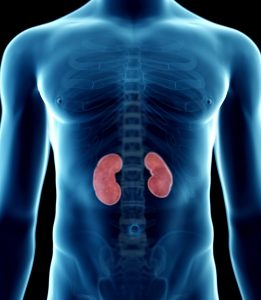Last year, kidney disease killed 4.5 million people around the world.

By 2030, it is estimated that 14.5 million people will have end-stage kidney disease1. This means they will need a kidney transplant or depend on blood filtering machines to survive.
These numbers are too high.
This week, 23rd – 29th March, is Kidney Health week – a perfect time to reflect on the importance of kidney health.
To find out more about kidney disease and new research investigating treatments, we talked to Professor Josephine Forbes. Professor Forbes is one of Australia’s leading researchers exploring the links between kidney disease and diabetes. She leads a team at Mater Health in Queensland investigating and developing new therapies for the prevention and treatment of kidney disease caused by diabetes. Here is what she had to say.
Q: What are the kidneys? And why are they important?
The kidneys are a really important organ – that is why we have two of them.
They are basically the ‘pool filters’ of the body. They act to filter the blood to remove toxins and waste products. But they also have another five vital but less well-known roles:
- The kidneys make proteins that help our body regulate our blood pressure.
- They help keep our bones healthy.
- Kidneys also assist in the production of red blood cells, which transport oxygen around our body.
- They reabsorb things from our urine. So while they filter everything out of the blood into the urine, they also actively look at the urine and work out if there is anything in there we need to keep. This is so we don’t lose anything important, particularly after we have already gone to the trouble of digesting it. The kidneys actively pull things back out of the urine.
- They also maintain our fluid and salt balance, regulating salts like potassium and sodium which are really important for our health. This helps control how much water is in our body at any time.
Q: What is the link between diabetes and kidney function?
People with diabetes commonly get complications, and one of these is kidney disease. This is because high levels of glucose in the blood, which occur with diabetes, damage the kidneys and stops them from working properly.
In the long-term, diabetic kidney disease ultimately becomes cardiovascular disease. It is the major risk factor for heart attacks, strokes and death in people with diabetes.
Last year, 4.5 million people died from diabetes around the world. Some of these are in low-income nations and have limited access to health care and medications. However, a large number are in high-income countries and are dying from complications, such as kidney and cardiovascular disease.
Around 50% of people that die from diabetes are under the age of 60 years. These numbers are shocking. This is where I want to help with my research.
Q: How many people with diabetes go on to develop kidney disease?
Between 30% and 40% of people with diabetes develop kidney disease.
This depends on how old they are at diagnosis and whether they have type 1, type 2 or gestation diabetes (which can often become type 2 diabetes in later life). The number is too high.
Around half of all cases of patients with diabetic kidney disease will go on to one day need a kidney transplant or dialysis. This is where the kidneys don’t work properly so people need to go onto a machine to filter their blood. Helping to stop people with diabetes from developing cardiovascular disease or needing a kidney transplant or dialysis is a major goal of my research.
Q: If people have diabetes, how long does it take to develop kidney disease?
We used to think it took around 10 to 15 years, or even more, to develop kidney disease. New evidence suggests it is much earlier.
We are seeing children as young as 10 years old with type 1 diabetes who already have signs of kidney impairment or some kidney dysfunction. In our study, we have shown that it is sometimes present at diagnosis – some of these children are only 5 years old.
The reason we may not have noticed it in the past is that the clinical tools that have been used to assess kidney function look for markers of severe kidney impairment. A lot of previous studies have also looked at mostly older people with late-stage disease, so we just didn’t see it. But we now know have a better idea about when and what to look for.

Professor Jo Forbes conducts leading research investigating new medications to prevent and treat diabetic kidney disease.
Q: How is your research in diabetic kidney disease addressing this problem?
One of the problems with diabetic kidney disease is that all the medications currently available only slow down its progression. Nothing prevents the disease from developing in the first place. And nothing stops the disease from progressing once it starts. This is the area I am very interested in.
We may not think the kidneys need a lot of energy, but if we think about all the roles of the kidney, we can start to understand they do need a lot of energy to keep working.
My research team is interested in the cell’s power stations, called mitochondria. In diabetes, these power stations are damaged and don’t work effectively, so the kidneys can’t produce enough energy to function properly.
We have been partnering with drug companies to see if we can find medicines that can restore the function of the power stations. This is done in different ways using cells and some preclinical models.
We are now also up to the stage where we are testing some of our medicines in people with diabetic kidney disease.
Q: What progress have you made so far?
It is early, but we have a few studies that are looking promising.
The first is looking at whether we can repurpose a drug that is being tested to treat another condition, called mitochondriopathy. This is a serious disease that negatively affects the power stations of the cells.
We have received permission from the FDA to test this drug in diabetic kidney disease while it is being tested for mitochondriopathy, given that diabetes also damages these power stations. We are currently conducting studies to test its safety and effectiveness in young people with kidney disease. This is being done at the Mater Hospital in Queensland. The next phase will be a bigger study, which will be conducted at a number of sites to look at different populations in different areas.
Another of our studies is testing a new molecule. It is in the very early stages of clinical development, and still needs to be tested for safety first. It will be a little while yet before we will know if this works to prevent kidney disease.
While we are interested in the prevention of kidney disease, we are looking at early kidney disease in young people. But we think these drugs will also be useful in older people who get type 1 diabetes, which is a growing population. And our early data from pre-clinical studies suggest that these drugs may also work for people who already have kidney disease.
Q: What can people with diabetes do to avoid developing kidney disease?
The best way to avoid kidney damage is to control your blood glucose levels.
For young people, this is a real challenge. It can be hard to control blood glucose when all their other hormones are soaring! Normally insulin released by the pancreas keeps blood glucose under control. But because children and adolescents are still growing, their bodies become somewhat insulin-resistant so that all the food they eat goes towards growth rather than storage.
In the meantime, young people can reduce the risk by keeping themselves as healthy as possible. This means avoiding weight gain through a sensible diet containing fresh fruit and vegetables, as well as doing regular exercise. They can also manage their blood glucose control as much as possible and have regular check-ups to make sure their blood pressure is OK.
Older people with diabetes can do the same things: Manage their blood glucose, watch their diet, exercise, and get regular check-ups including having their kidney function tested.
Kidney check-ups are not necessarily routinely done as part of a diabetes check. However, there is growing recognition that kidneys are affected.
While we may not yet have any medications to prevent or reverse kidney disease, it is possible to stop the progression of complications to prevent heart attack and stroke. This is why having a kidney check is so important!
Q: What would you like everyone to know about diabetes and kidney disease?
- Diabetes and kidney disease are important and more common than you might think.
- It is important for people with diabetes to stay healthy, manage their blood glucose and have regular check-ups, including a kidney check.
- Research is really important because better clinical management alone is not going to stop people from dying. Research is the only way to find new treatments to prevent poor outcomes for those living with diabetes.
References
- International Society of Nephrology (2019). Global Kidney Health Atlas. http://www.theisn.org/focus/ckd#health-atlas







